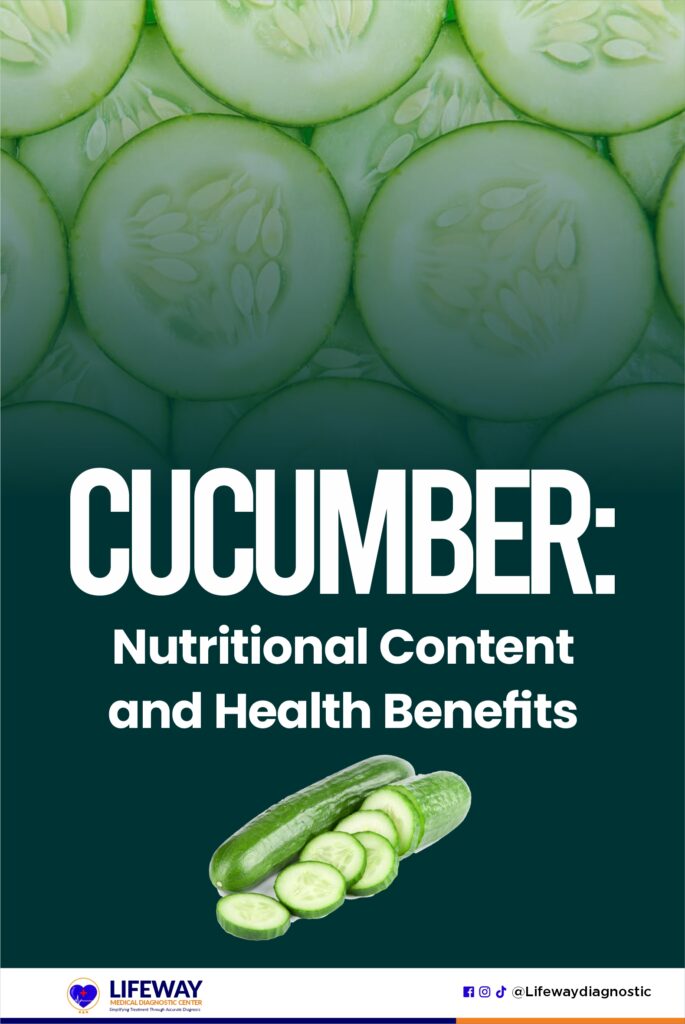Cucumber is a versatile and nutrient-rich vegetable that offers a wide range of health benefits. It is well known for its crisp texture, high water content, and mild flavor.

Though low in calories, cucumbers are rich in antioxidants and essential nutrients.
Including cucumber in your diet is not only refreshing, but it also offers a range of nutritional benefits and health advantages.
Keep reading to understand the nutritional content of cucumbers and explore their numerous health benefits.
About Cucumber
Cucumber (Cucumis sativus) is a creeping plant belonging to the gourd family (Cucurbitaceae). Its edible fruit, with cylindrical to spherical shapes and impressive length, contributes to its high value and widespread cultivation.
Cucumbers have a refreshing taste and are a popular ingredient in various cuisines around the world.
There are various cucumber varieties, including slicing cucumbers, pickling cucumbers, and seedless/burpless cucumbers.
Slicing cucumbers are typically larger and used for fresh consumption while pickling cucumbers are smaller and ideal for pickling.
Seedless cucumbers on the other hand are increasingly popular due to their lack of large seeds.
Cucumbers are cultivated in many regions with warm climates. They require well-drained soil, ample sunlight, and regular watering.
Nutritional Content of Cucumber
Cucumbers consist of around 95% water, making them an excellent source of hydration. However, their nutritional value extends far beyond their high water content.
Cucumbers are low-calorie fruits with rich sources of various essential vitamins, minerals, and antioxidants, including:
- Vitamins: Cucumbers contain notable amounts of vitamins K, C, B1, B2, B3, B5 (pantothenic acid), B6, A, and Folic Acid.
- Antioxidants: Cucumbers are rich in antioxidants, such as flavonoids and tannins, which help neutralize harmful free radicals in the body.
- Minerals: They are a good source of minerals, such as Copper, Magnesium, Calcium, Iron, Phosphorus, Zinc, Manganese, and Potassium.
- Fiber: Cucumbers contain a decent amount of fiber, which supports digestive health and can aid in weight management.
- Water: Cucumbers contain approximately 95% water, making them an excellent choice for hydration, especially during hot weather.
Health Benefits of Cucumber
- Hydration: Due to their high water content, cucumbers can help keep you hydrated, supporting various bodily functions.
- Weight Management: Cucumbers are low in calories and high in water and fiber, making them a satisfying and nutritious addition to a weight loss or weight management plan.
- Nutrient-Rich: Cucumbers pack essential vitamins and minerals, contributing to overall health and well-being.
- Antioxidant Properties: Cucumbers contain antioxidants, such as flavonoids and tannins, which help fight free radicals and reduce the risk of chronic diseases.
- Blood Sugar Control: Some studies suggest that cucumbers may help lower blood sugar levels and prevent complications related to diabetes.
- Digestive Health: The fiber content in cucumbers promotes regular bowel movements and supports a healthy digestive system.
- Using cucumber slices freshens breath and removes garlic odor from the hands.
- Cucumbers reduce puffiness and inflammation around the eyes.
- You can also add cucumbers to smoothies, juices, and soups for an extra boost of nutrients and flavor.
How to add Cucumber to your diet
Cucumbers can be enjoyed in various ways, depending on personal preference. However, before consuming, it is important to wash them thoroughly and, if desired, peel the skin or remove the seeds.
Here are some ideas for incorporating them into your meals and snacks:
- Add sliced cucumbers to salads, sandwiches, or wraps for a refreshing crunch.
- Blend cucumbers into smoothies or juices for a hydrating and nutrient-dense beverage.
- Enjoy cucumber slices with hummus or a yogurt-based dip as a healthy snack.
- Incorporate cucumbers into cold soups, such as gazpacho, for a refreshing and flavorful dish.
- Use cucumber ribbons or noodles as a low-calorie alternative to pasta.
Conclusion
Often overlooked for its simplicity, cucumber is a nutritional powerhouse that offers a wide range of health benefits.
Cucumber is not only a hydrating and low-calorie vegetable but also a valuable source of essential nutrients and antioxidants. Adding cucumbers to your diet can provide numerous health benefits, from supporting hydration and weight management to promoting skin health and aiding digestion.
So next time you reach for a cucumber, remember that you’re not just enjoying a refreshing snack, but also reaping a wealth of health benefits.
Recommendations
- What are the symptoms of Kidney Disease?
- Health Benefits of Clapping Hands
- Health Benefits of Oatmeal
- Glaucoma: Types, Symptoms, Diagnosis, and Treatment
